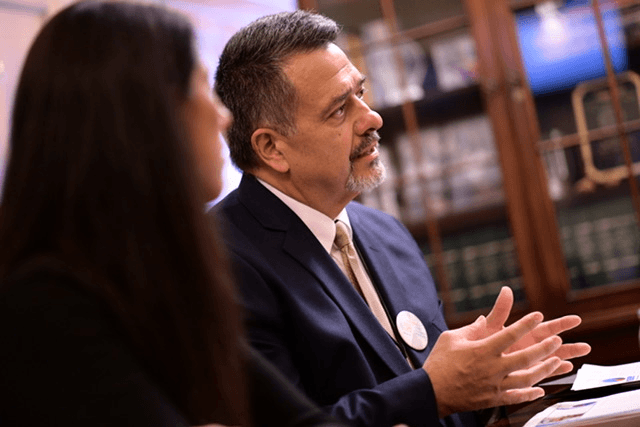
- Details
- By Joe Boomgaard
GRAND ISLAND, Neb. — When Pete Upton applied to have Native360 Loan Fund Inc. considered for Google.org Impact Challenge funding late last year, he had no way of knowing how much his organization and its clients would be upended by COVID-19 just a few months later.
These days, Upton — the executive director of Native360, a community development financial institution (CDFI) serving all Native American communities in its service area — counts the $175,000 in funding from the Google program as a true “blessing” that’s helped the organization react quickly to assist Native entrepreneurs in a very turbulent period.
“The Google grant really came at a great time, not knowing when we applied for it what was going to happen,” Upton, an enrolled member of the Ponca Tribe of Nebraska, told Native News Online.
While Google.org, the tech giant’s philanthropic arm, announced the five awardees last month, Native360 actually received the funding earlier in the year. The funding, which was intended to help build out the organization’s technical assistance and training programs, came at a time of great need for Native360’s clients, which span multiple industries across a three-state area, including Nebraska, southeastern South Dakota and western Iowa.
“We were able to assist our clients with technical assistance on reopening their businesses, preparing their social distancing (plans) and working with them,” he said. “The biggest thing is assisting them in preparing a 90-day financial scenario and determining a breakeven point at a lesser capacity than they might normally be dealing with.”
ADAPTING TO CHANGE
Native360 had focused on in-person delivery of its technical assistance programs, but had to quickly change gears and adapt to new technologies like Zoom. That process brought about its own set of challenges, ranging from the “adaptive learning curve” with any new technology to poor broadband connectivity in parts of the service area.
The organization also leveraged the Google.org funding to help Native entrepreneurs access financial assistance early on in the pandemic, Upton said. Native360 was part of a coalition with Lakota Federal Credit Union and Lakota Funds — both based in Kyle, S.D. — as well as the Four Bands Community Fund of Eagle Butte, S.D. and the Bismarck, N.D.-based Native American Development Center that approached the Minneapolis-based Community Reinvestment Fund for help with their clients in the upper Midwest and Plains states.
The reason: Many Native-owned businesses struggled to secure Paycheck Protection Program (PPP) loans or the Emergency Industry Disaster Loan (EIDL) program from the U.S. Small Business Administration.
“A lot of our clients that we deal with weren’t able to access the PPP program through their traditional banking services,” Upton said. “Your small entrepreneurs, they’ve been impacted greatly just because they may have not had a strong banking relationships. Most of the banks required you to have a banking relationship before you were able to apply for the PPP program or the EIDL program, and that’s where a lot of our Native entrepreneurs kind of suffered.”
Throughout the pandemic and the havoc it has wreaked on Native-owned small businesses, Native360 has focused on bringing clients resources to “get them from Point A to Point B,” according to Upton. That has meant helping them find ways to deal with the new realities of the business environment and secure whatever funding is available.
One client, a Native-owned tattoo shop in Wagner, S.D., opened for business on March 10 and then had to shut down less than three weeks later because of the pandemic. In that case, Native360 found resources “for them to be able to make ends meet,” Upton said. The organization also helped a Native-owned tree services business access the PPP program after the owner initially tried and failed to secure the funding.
“It was a small amount that he got — probably about $10,000 — but still for his small business, that was huge for him to get from point A to point B,” Upton said. “That’s really what we tried to do.”
‘IN A PREDICAMENT’
Upton and others have pointed out the disproportionate economic effects of the COVID-19 pandemic on Indian Country and Native entrepreneurs in particular.
For example, in an April survey, the Plains Regional Native CDFI Coalition found that 38 percent of tribal businesses in a four-state area had already closed, and all respondents said they would be completely out of money by October.
Meanwhile, Washington, D.C.-based Native CDFI Network released a survey in March that found even then that 86.2 percent of Native CDFIs had made loans to businesses affected by the pandemic. At the time, the member Native CDFIs expressed concern over how restructuring loans during the pandemic might affect lending capital going forward.
Early on in the pandemic, Native360 turned to its major funder, the Oweesta Corporation — a Native CDFI intermediary based in Longmont, Colo. — to secure the latitude it needed to work with clients on loan deferrals and renegotiations, Upton said.
“We were kind of in a predicament because we couldn’t necessarily go out and renegotiate loans until our funders came to us and did basically interest forbearance for us,” he said. “Our hands were kind of tied because you really couldn’t restructure things until your funding sources restructured their loans with you.”
Upton credited the focus on collaboration in Indian Country, especially during the pandemic. “Everybody’s out to help one another,” he said.
That collaborative spirit also extends to non-Native organizations. To that end, Native360 is working with Marquette, Mich.-based Northern Initiatives — a non-Native CDFI — to adapt its online training portal for Indian Country, Upton said.
“The Google Impact Challenge award has really opened a lot of doors for us and made a lot of connections for us as well,” he said.
BUILDING GENERATIONAL WEALTH
CDFIs generally serve as a lender of last resort for budding entrepreneurs who want to create a small business, and often work with clients over a long period of time to hone an idea into a viable company. While loan sizes vary among CDFIs, many Native CDFIs focus on microlending, said Upton, who is the chair of the board for the Native CDFI Network.
In recent years, Native360 heard from clients that they wanted more hands-on assistance, not “one-and-done” programs, which initially led Upton to apply for the Google.org funding.
Building out the online capabilities for service delivery via the funding only helps Native360 fulfill those needs and stay connected. For example, Native360 is partnering with Lakota Funds and Okmulgee, Okla.-based Mvskoke Loan Fund to offer virtual entrepreneurial training for a half-hour daily from Sept. 8-10.
“We just have to be patient with our clients and work with them for the long haul,” he said. “In the Native community, you just don’t have a lot of generational assets. It’s our intent — through small businesses, through working with consumers — to work with them for the long haul to build generational assets, to build wealth. The Google Impact Challenge award really provides us with that long-term commitment to our clients and the community that we’re going to be there and provide one-on-one technical assistance. That’s what it really boils down to.
“It was God’s blessing that we were chosen because it really helped us assist one of the most impacted communities. The Native community has been one of the most impacted with COVID, and we’ve been able to assist them in bringing expertise to the table.”
--
EDITOR’S NOTE: This story has been updated to note Native360 Loan Fund is not sponsored by any one tribe, but rather serves all Native Americans.
More Stories Like This
American Basketball Association Announces Native ABA InitiativeFour Winds South Bend Upgrades to Class III Gaming Casino
Native News Online Wins Two Awards from Native American Journalists Association
Wahlberg Brothers Are a Big Hit at Indian Gaming Tradeshow and Convention in Las Vegas
Native Gro Offers Tribes a ‘One-Stop Shop’ for Entering the Cannabis Industry
Help us defend tribal sovereignty.
At Native News Online, our mission is rooted in telling the stories that strengthen sovereignty and uplift Indigenous voices — not just at year’s end, but every single day.
Because of your generosity last year, we were able to keep our reporters on the ground in tribal communities, at national gatherings and in the halls of Congress — covering the issues that matter most to Indian Country: sovereignty, culture, education, health and economic opportunity.
That support sustained us through a tough year in 2025. Now, as we look to the year ahead, we need your help right now to ensure warrior journalism remains strong — reporting that defends tribal sovereignty, amplifies Native truth, and holds power accountable.
 The stakes couldn't be higher. Your support keeps Native voices heard, Native stories told and Native sovereignty defended.
The stakes couldn't be higher. Your support keeps Native voices heard, Native stories told and Native sovereignty defended.
Stand with Warrior Journalism today.
Levi Rickert (Potawatomi), Editor & Publisher

